Diplomatic Bluebook 2025
Chapter 2
Japan's Foreign Policy by Region
3 Collaboration with Regional Institutions
(1) Cooperation with the North Atlantic Treaty Organization (NATO)
NATO is an organization that aims to ensure the freedom and security of its member countries through political and military means, including collective defense, based on the North Atlantic Treaty. In addition to “deterrence and defense” of its member countries, NATO engages in “crisis prevention and management” beyond its borders, such as peacekeeping activities and counter-terrorism efforts, in response to crises that could pose direct security threats to its member countries, and “cooperative security” through collaboration with partner countries and institutions. In response to Russia's aggression against Ukraine, NATO adopted a new “Strategic Concept” in 2022, which presented guidelines for enhancing dialogue and cooperation with partners in the Indo-Pacific. Amid NATO's growing interest in the Indo-Pacific, cooperation between Japan and NATO has become even more important based on the recognition that the security of the Euro-Atlantic and Indo-Pacific is inseparable.
The Indo-Pacific partners (IP4: Japan, Australia, New Zealand, and the Republic of Korea (ROK)) were invited for the first time to the NATO Summit and Meeting of NATO Ministers of Foreign Affairs in 2022. In April 2024, State Minister for Foreign Affairs TSUJI Kiyoto attended the Meeting of NATO Ministers of Foreign Affairs, and in July, Prime Minister Kishida participated in the NATO Summit for the third consecutive year on behalf of Japan. At the Summit, it was announced that in order to establish lasting cooperation between the IP4 and NATO, flagship projects would be pursued in four areas: (a) support to Ukraine, (b) cyber defense, (c) hostile information, including disinformation, and (d) technology. In the meeting held between Prime Minister Kishida and NATO Secretary General Jens Stoltenberg, both leaders welcomed the flagship projects. In September, during the UN General Assembly, Prime Minister Kishida held a meeting with NATO Secretary General Stoltenberg, in which the leaders concurred on continuing to cooperate toward the further development of the Japan-NATO relationship. In October, the defense ministers of the IP4 were invited for the first time to the Meeting of NATO Ministers of Defence. Defense Minister NAKATANI Gen attended on behalf of Japan and held a meeting with the newly appointed NATO Secretary General Mark Rutte, who assumed his position on October 1.
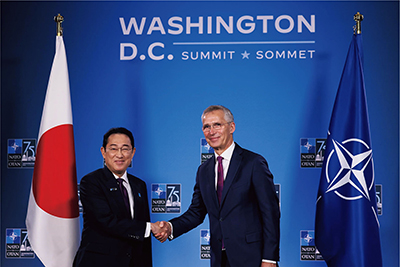 Joint Press Occasion between Prime Minister Kishida and NATO Secretary General Stoltenberg at the NATO Summit (July 11, Washington, D.C., U.S.; Photo: Official Website of the Prime Minister of Japan and His Cabinet)
Joint Press Occasion between Prime Minister Kishida and NATO Secretary General Stoltenberg at the NATO Summit (July 11, Washington, D.C., U.S.; Photo: Official Website of the Prime Minister of Japan and His Cabinet)(2) Cooperation with the Organization for Security and Co-operation in Europe (OSCE)
The OSCE is a regional security organization with 57 participating states across Europe, the Central Asia and Caucasus region, and North America, that works to bridge differences between participating states and foster trust through conflict prevention, crisis management, and post-conflict recovery and reconstruction in these regions through a comprehensive approach. Japan has cooperated with the OSCE since 1992 as an Asian Partner for Co-operation. Japan provides support to Afghanistan and Central Asian countries to strengthen border controls to prevent terrorism and enhance the capabilities of customs officials, to strengthen the leadership capacity of women in conflicts in Ukraine and neighboring countries, and to strengthen the capacity to prevent human trafficking. Furthermore, the OSCE has been playing an important role in improving the situation in Ukraine even before Russia's aggression began in 2022. Japan has been providing financial support and dispatching experts to the OSCE Special Monitoring Mission (SMM) (experts were dispatched intermittently since August 2015, and dispatches ended in February 2022). Additionally, in October 2024, Japan co-hosted the OSCE Asian Conference in Vienna as the chair country of the Asian partners for co-operation. State Minister for Foreign Affairs Tsuge attended the conference and spoke on the importance of strengthening cooperation between OSCE participating countries and the Asian partner countries.
Japan has been attending the OSCE Ministerial Council every year. State Minister for Foreign Affairs FUJII Hisayuki participated in the council held in December in Malta. At the council, he stated that Japan will further strengthen cooperation with the OSCE, which addresses issues with a comprehensive approach.
(3) Cooperation with the Council of Europe (CoE)
The CoE is an international organization comprising 46 member states in Europe, which has played a key role in establishing international standards in areas concerning democracy, human rights, and the rule of law. In September, Alain Berset assumed the position of Secretary General of the CoE. As the CoE's sole observer country in Asia since 1996, Japan has contributed to the CoE by providing expertise and supporting the holding of meetings. Japan also participates as an Associate Member in the Register of Damage Caused by the Aggression of the Russian Federation against Ukraine, a mechanism established to record damage caused by Russia's aggression against Ukraine. In addition, in November, Japan also made a policy statement at the World Forum for Democracy. Moreover, in May, the Committee on Artificial Intelligence (CAI), in which Japan participates as an observer, adopted the Council of Europe Framework Convention on Artificial Intelligence and Human Rights, Democracy and the Rule of Law, the first international legally binding instrument on AI.
(4) Cooperation through the Asia-Europe Meeting (ASEM)
ASEM was established in 1996 as the sole forum for deepening dialogue and cooperation between Asia and Europe. Its members currently comprise 51 countries and two institutions. It works through summit meetings, ministerial meetings including foreign ministers' meetings, seminars, and other activities focused on three pillars, namely (a) politics, (b) economy, and (c) society and culture.
The Asia-Europe Foundation (ASEF) is ASEM's only permanent institution. It is located in Singapore and is responsible for activities in the field of society and culture, one of the three pillars.
Japan has supported the ASEF with its project stockpiling medical personal protective equipment (PPE) and antiviral drugs to combat infectious diseases, and cooperated in the emergency transportation of stockpiled supplies to ASEM partners and the implementation of capacity building workshops for emergency response and public health network projects. As part of these efforts, from February to September, on-site surveys were conducted in four countries (Indonesia, Thailand, Kazakhstan, and Sweden) under the joint project between ASEF and the World Health Organization (WHO) entitled “Addressing antimicrobial resistance (AMR) by strengthening primary health care (PHC): Piloting the WHO AMR People-Centred Approach in priority countries.” In November, the “High-level Meeting on Risk Communication for Public Health Emergencies” was held in Singapore. As part of ASEF's “Project for Strengthening Preparedness and Response to the COVID-19 and other Emerging Infectious Diseases” with financial contributions by Japan, Japan has supported the stockpiling initiative conducted by the International Federation of Red Cross and Red Crescent Societies (IFRC) in several Asian countries (Bangladesh, Indonesia, Malaysia, Pakistan, and the Philippines). In addition, Japan decided to provide financial support through WHO for infectious disease countermeasures for Ukrainian displaced persons, to be provided to Ukraine and its neighboring countries that accept Ukrainian displaced persons (ASEM partner countries: Poland, Romania, Hungary, Slovakia, Czech Republic, and Bulgaria, non-ASEM partner country: Moldova).
In addition, Japan contributed to ASEM's activities including through the implementation of ASEF Classroom Network online projects as a co-host, and its financial contributions to the ASEF.
Russia's aggression against Ukraine, which began in February 2022, continues to have a significant impact on neighboring countries.
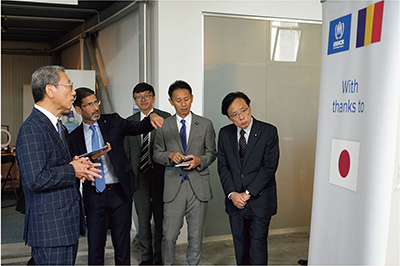 Vice President of the House of Councillors NAGAHAMA Hiroyuki (foreground left) and others receive an explanation from Pablo Zapata, the Acting representative of UNHCR Romania, on how Japan's support is being used at a Ukrainian displaced persons support center (September 4, Bucharest, Romania; Photo: UNHCR Romania)
Vice President of the House of Councillors NAGAHAMA Hiroyuki (foreground left) and others receive an explanation from Pablo Zapata, the Acting representative of UNHCR Romania, on how Japan's support is being used at a Ukrainian displaced persons support center (September 4, Bucharest, Romania; Photo: UNHCR Romania)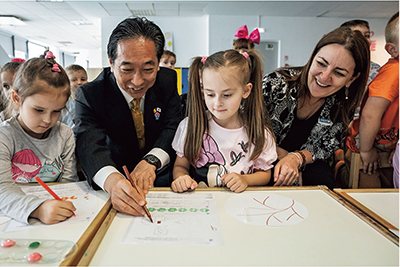 Ambassador of Japan to Romania Katae visits an educational facility for Ukrainian children supported by UNICEF Romania, guided by Representative Anna Riatti (May 20, Bucharest, Romania; Photo: UNICEF Romania)
Ambassador of Japan to Romania Katae visits an educational facility for Ukrainian children supported by UNICEF Romania, guided by Representative Anna Riatti (May 20, Bucharest, Romania; Photo: UNICEF Romania)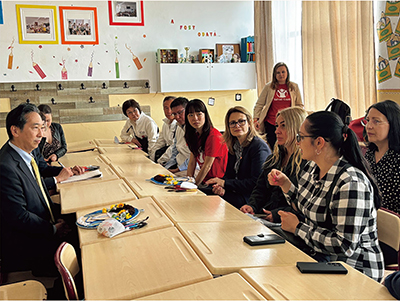 Ambassador Katae exchanges views with parents at an educational facility for Ukrainian children supported by Save the Children Japan (April 22, Năvodari, Romania)
Ambassador Katae exchanges views with parents at an educational facility for Ukrainian children supported by Save the Children Japan (April 22, Năvodari, Romania)Since the onset of the aggression, a cumulative total of approximately 10.5 million Ukrainians (as of November 2024) have entered Romania, which shares a border with Ukraine. The Government of Romania has provided temporary protection measures to approximately 170,000 Ukrainians. In addition, despite having limited prior experience in receiving displaced persons, the Government of Romania has worked on various support efforts in cooperation with international organizations and NGOs, including facilitating access to healthcare, providing educational opportunities for children, and helping with integration into Romanian society. Even now, nearly 1,000 days since the aggression began, approximately 80,000 Ukrainians continue to live as displaced persons in Romania. In this regard, Romania can be considered one of Ukraine's neighboring countries most heavily impacted by Russia's aggression.
The Government of Japan, through support to international organizations and Japanese NGOs, has been assisting not only Ukrainian displaced persons in Romania but also the host communities within Romania that support them.
The Embassy of Japan in Romania supports the activities carried out by international organizations such as the United Nations High Commissioner for Refugees (UNHCR), the World Health Organization (WHO), the United Nations Children's Fund (UNICEF), and the International Organization for Migration (IOM), which are implemented with funding from the Government of Japan, as well as initiatives to support Ukrainian displaced persons by Japanese NGOs including Good Neighbors Japan, Save the Children Japan, and Nippon International Cooperation for Community Development (NICCO). To bolster these efforts, the Embassy visits the sites of support activities, identifies how Japan's support is being utilized and any challenges, leverages this information for future support, and actively communicates to the public, thereby working to make Japan's support more visible.
To help Ukrainian displaced persons living in Romania regain their peaceful daily lives as soon as possible, the Embassy of Japan in Romania will continue to actively work as a bridge connecting various Romanian support organizations with Japanese society, thereby contributing to the support of both Ukrainian displaced persons and host communities.
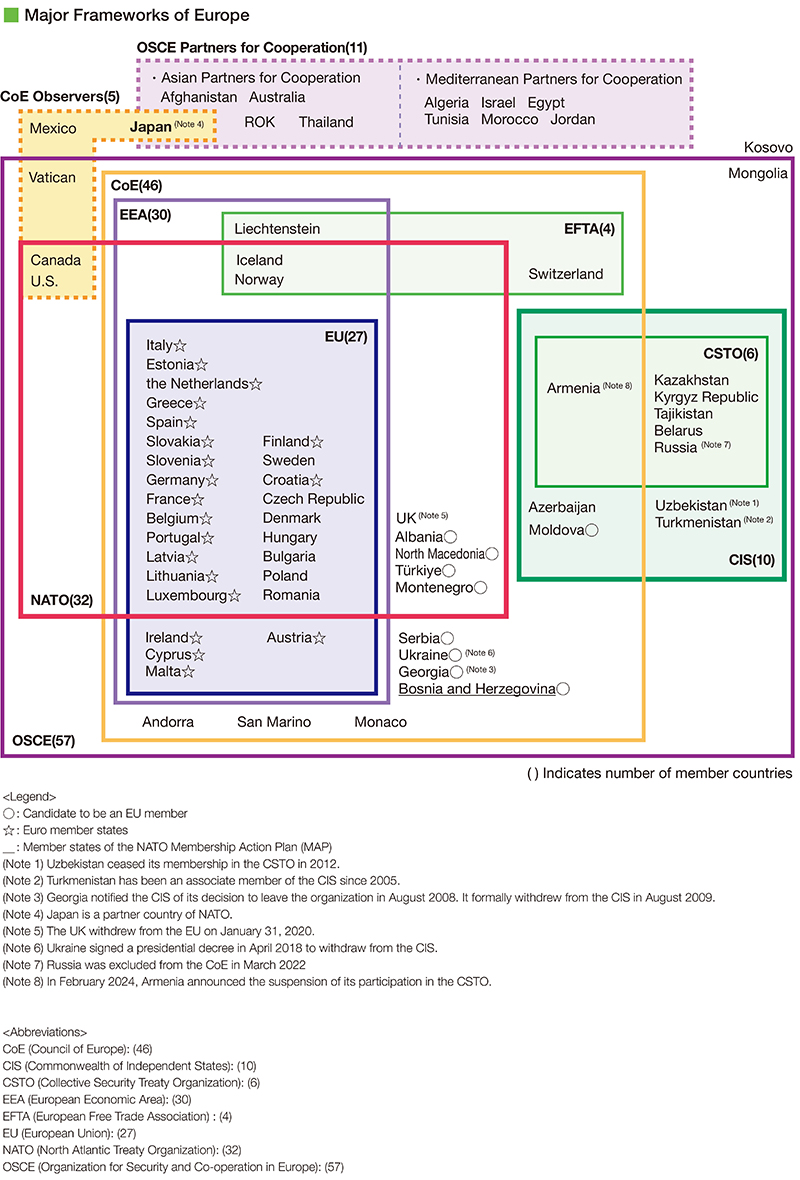
Other European Regions
Nordic countries
Iceland: On November 30, a general parliamentary election was held. The Social Democratic Alliance became the largest party, and Kristrún Frostadóttir was appointed as Prime Minister.
Sweden: In January, Foreign Minister Kamikawa visited Stockholm and held a meeting with Minister for Foreign Affairs Tobias Billström. In July, Prime Minister Kishida, during his visit to the U.S. to attend the NATO Summit, held a summit meeting with Prime Minister Ulf Kristersson, and both leaders concurred on further strengthening bilateral cooperation in all areas, including security.
Denmark: In July, State Minister for Foreign Affairs Tsuji held a meeting with Deputy Prime Minister and Minister of Foreign Affairs, Industry and Trade of the Faroe Inslands, Høgni Hoydal, who was visiting Japan. In October, a delegation from the Foreign Policy Committee of the Danish Parliament visited Japan and paid a courtesy call on Parliamentary Vice-Minister for Foreign Affairs Fukazawa.
Norway: In July, during her visit to Laos to attend the ASEAN-related Foreign Ministers' Meetings, Foreign Minister Kamikawa held a meeting with Minister of Foreign Affairs Espen Barth Eide.
Finland: In January, Foreign Minister Kamikawa visited Helsinki and held a meeting with Minister of Foreign Affairs Elina Valtonen. In July, during his visit to the U.S. to attend the NATO Summit, Prime Minister Kishida held a meeting with President Alexander Stubb, and both leaders concurred on further strengthening bilateral cooperation in all areas, including security and the economy. In December, Prime Minister Ishiba held a meeting with Prime Minister Petteri Orpo, who was visiting Japan, and announced the commencement of negotiations on the Agreement concerning the Transfer of Defense Equipment and Technology.
Benelux countries
The Netherlands: In January, Foreign Minister Kamikawa visited the Netherlands, paid a courtesy call on Prime Minister Mark Rutte, and held a Japan-Netherlands Foreign Ministers' Meeting, during which both sides shared the recognition that the security of the Euro-Atlantic and Indo-Pacific is inseparable. In July, Prime Minister Kishida held his first summit meeting with Prime Minister Dick Schoof during the NATO Summit in the U.S.. Prime Minister Kishida welcomed the Netherlands' concrete engagement in the Indo-Pacific region, including the dispatch of the frigate HNLMS Tromp to Japan, and confirmed that they would continue working together in all areas, including security. In September, the Japan-Netherlands Peace Exchange Program was held, and five Dutch civilians who had been interned by the Japanese military during World War II were invited to visit Japan.
Belgium: In May, Foreign Minister Kamikawa held a telephone call with Minister of Foreign Affairs Hadja Lahbib, during which both sides concurred on strengthening Japan-Belgium bilateral relations and cooperation toward Expo 2025 Osaka, Kansai, and the 160 Years of Freindship between Japan and Belguim in 2026. The two ministers also exchanged views on regional affairs and concurred on working together.
Luxembourg: In January, Foreign Minister Kamikawa held a meeting in Tokyo with Vice Prime Minister, Minister for Foreign Affairs and Foreign Trade, and Minister for Development Cooperation and Humanitarian Affairs, Xavier Bettel, who was visiting Japan. The two ministers shared the view that the close relationship between the Imperial Household and the Grand Ducal Household is the cornerstone of excellent bilateral relations and concurred on further deepening friendly bilateral relations. Prior to the meeting, the two ministers exchanged notes verbale concerning the introduction of the Japan-Luxembourg Working Holiday Programme. In June, the Luxembourg Economic Mission led by Crown Prince Guillaume of Luxembourg visited Japan and held meetings with Prime Minister Kishida and Foreign Minister Kamikawa. Prior to the meeting between Foreign Minister Kamikawa and Crown Prince Guillaume, a signing ceremony was held for the Japan-Luxembourg Air Services Agreement and the Memorandum of Cooperation between relevant ministries and agencies in the field of Space Activities for Peaceful Purposes.
Baltic countries
Estonia: In March, Foreign Minister Kamikawa held a meeting with Minister of Foreign Affairs Margus Tsahkna, who was visiting Japan as a guest of the Ministry of Foreign Affairs. In July, Prime Minister Kaja Kallas stepped down from her position as Prime Minister after being nominated to become EU High Representative for Common Foreign and Security Policy, and the new administration led by Prime Minister Kristen Michal was inaugurated.
Latvia: In February, Foreign Minister Kamikawa held a foreign ministers' meeting and another meeting with Minister for Foreign Affairs Krišjānis Karinš, who was visiting Japan as a guest of the Ministry of Foreign Affairs.
Lithuania: In May, a presidential election was held, and incumbent President Gitanas Nausėda was re-elected after a runoff with Prime Minister Ingrida Šimonytė.
Ireland: On November 29, a general election was held, and Fianna Fáil – The Republican Party became the party with the most seats. On January 23, Micheál Martin was appointed as Prime Minister by the lower house of Ireland's parliament.
San Marino: As Heads of State of San Marino, Alessandro Rossi and Milena Gasperoni took office in April, followed by Captains Regent, Francesca Civerchia and Dalibor Riccardi in October. In June, a general election for the Grand and General Council of San Marino was held, and in July, the second Beccari administration was inaugurated under Minister of Foreign Affairs, Political Affairs, International Economic Cooperation and Digital Transition Luca Beccari.
The Vatican: In December, Archbishop of Tokyo Tarcisius KIKUCHI Isao was appointed Cardinal by Pope Francis. (Cardinals are ranked just below the Pope and have the right to vote in papal conclaves. There are now two incumbent Japanese Cardinals, including Cardinal Thomas Aquinas Manyo Maeda, Archbishop of Osaka-Takamatsu.)
Portugal: On March 10, a general election for the Assembly of the Republic was held, in which the opposition Democratic Alliance (AD), led by the Social Democratic Party (PSD), narrowly defeated the ruling Socialist Party (PS). PSD leader Luís Montenegro became Prime Minister.
Malta: On January 1, the Embassy of Japan in Malta was opened. In February, Parliamentary Vice-Minister for Foreign Affairs Fukazawa visited Malta and paid courtesy calls on Deputy Prime Minister Chris Fearne and Minister for Education, Sport, Youth, Research and Innovation Clifton Grima. Parliamentary Vice-Minister for Foreign Affairs Fukazawa also held a meeting with Permanent Secretary Christopher Cutajar of the Ministry for Foreign Affairs and Tourism. The two sides confirmed further progress in bilateral relations toward the 60th anniversary of the establishment of diplomatic relations between Japan and Malta in 2025. With Permanent Secretary Cutajar, a memorandum of cooperation on people-to-people exchanges was signed with the aim of accelerating bilateral coordination toward the introduction of a working holiday program. In December, State Minister for Foreign Affairs Fujii visited Malta to attend the 31st OSCE Ministerial Council, during which he paid a courtesy call on President Myriam Spiteri Debono of Malta and held a meeting with Deputy Prime Minister and Minister for Foreign Affairs and Tourism Ian Borg. Both sides concurred on continuing to closely cooperate to further develop bilateral relations.
Monaco: In Monaco, where interest in Japanese culture is growing, “Monaco-Japan Artistic Encounters” was held in November for the first time in four years since the start of the COVID-19 pandemic. In September, Didier Guillaume was newly appointed as Minister of State (equivalent to Prime Minister).
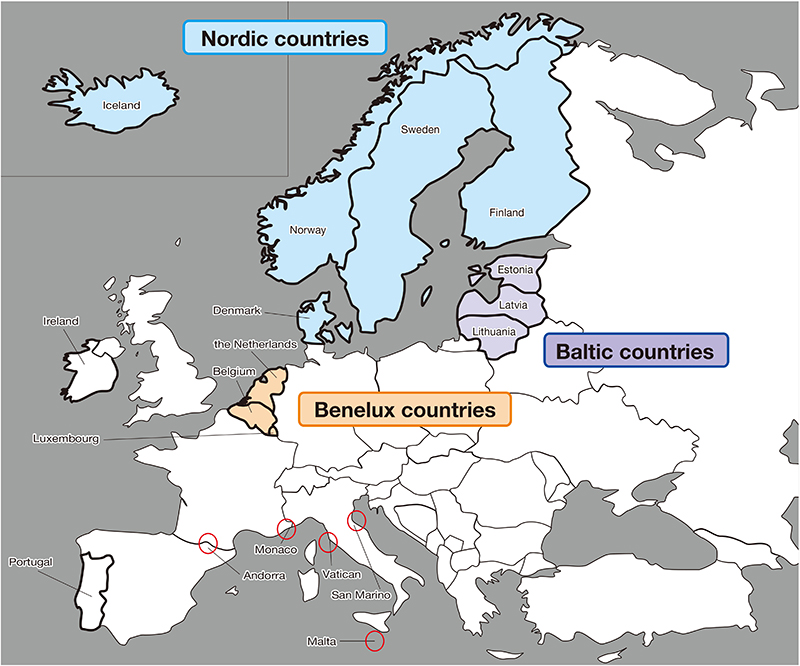
V4
Bilateral relations between Japan and the V4 countries of Slovakia, the Czech Republic, Poland, and Hungary have a long history and are traditionally friendly. Cooperation with the V4, which are neighboring countries of Ukraine, is important for Japan as it continues to support Ukraine. Through the “V4+Japan” cooperation framework, Japan has collaborated with the V4 in a wide range of fields.
Slovakia: There were exchanges at various levels between Japan and Slovakia. In February, State Minister for Foreign Affairs Tsuge held a meeting in Brussels with State Secretary of the Ministry of Foreign and European Affairs Marek Eštok. Deputy Prime Minister and Minister of Economy Denisa Saková as well as Deputy Prime Minister and Minister of the Environment Tomáš Taraba also visited Japan. In September, Vice President of the House of Councillors NAGAHAMA Hiroyuki visited Slovakia and held a meeting with Chairman Marián Kéry of the Foreign Affairs Committee of the National Council.
Czech Republic (V4 Chair until June): In February, State Minister for Foreign Affairs Tsuge exchanged views with Minister of Foreign Affairs Jan Lipavský in Brussels. Later in the same month, Foreign Minister Kamikawa and Foreign Minister Lipavský held a foreign ministers' meeting in Tokyo, during which they signed the Japan-Czech Republic Air Services Agreement.
Poland: * See 2 (7) Poland.
Hungary: In May, Foreign Minister Kamikawa held a foreign ministers' meeting with Minister of Foreign Affairs and Trade Péter Szijjártó, who was visiting Japan for the second consecutive year.
 * GUAM: GUAM (acronym for Georgia, Ukraine, Azerbaijan, and Moldova) was established by four countries of the former Soviet Union to promote democracy and stable economic development. Japan established the “GUAM+Japan” cooperation framework in 2007, and has held foreign minister-level and vice-minister-level meetings, as well as theme-based workshops with professionals and experts from GUAM countries, as part of invitation programs to Japan.
* GUAM: GUAM (acronym for Georgia, Ukraine, Azerbaijan, and Moldova) was established by four countries of the former Soviet Union to promote democracy and stable economic development. Japan established the “GUAM+Japan” cooperation framework in 2007, and has held foreign minister-level and vice-minister-level meetings, as well as theme-based workshops with professionals and experts from GUAM countries, as part of invitation programs to Japan.The Western Balkans
In the Western Balkans region, despite ongoing concerns about peace implementation and ethnic conflicts, including the separatist actions by the Republika Srpska, one of the two entities that make up Bosnia and Herzegovina, and the stalled dialogue aimed at normalizing relations between Serbia and Kosovo, countries in the region have made overall progress toward stability and development as they undertake reforms aimed at joining the EU. In addition, under the “Western Balkans Cooperation Initiative”(5) which Japan has led since 2018, Japan has been promoting support for economic reforms of Western Balkan countries aiming for EU membership and reconciliation and cooperation among the region's various ethnic groups through the promotion of bilateral dialogues with each Western Balkan country as part of bilateral cooperation; development cooperation through Official Development Assistance (ODA); programs that facilitate expansion by Japanese companies as well as sharing knowledge and inviting personnel to Japan to address common regional challenges as part of regional cooperation promotion and cooperation with third-party countries. As part of the invitation programs, in November, practitioners from the Western Balkans and Greece were invited to Japan under the theme of tourism. In December, under the MIRAI program, an exchange program with Europe, youth were invited to Japan under the theme of peacebuilding (in cooperation with the Regional Youth Cooperation Office of the Western Balkans). In February, the third Bulgaria-Japan-Western Balkans Workshop “Improving Disaster Risk Management Understanding” was held.
- (5) In January 2018, Prime Minister Abe became the first Japanese prime minister to visit Serbia, where he announced the “Western Balkans Cooperation Initiative” to advance cooperation with the Western Balkan countries (Albania, North Macedonia, Kosovo, Serbia, Bosnia and Herzegovina, and Montenegro) on their path to join the EU, and promoted cooperation with the entire Western Balkan region in areas such as youth exchanges and economic exchanges.
Albania: In July, Parliamentary Vice-Minister for Foreign Affairs Fukazawa visited Albania and held a meeting with Minister for Europe and Foreign Affairs Igli Hasani. Also in July, a delegation from the House of Representatives conducting a study on diplomacy and political/economic conditions in European countries visited Albania and paid courtesy calls on Prime Minister Edi Rama and others.
North Macedonia: In March, the leaders and foreign ministers of Japan and North Macedonia exchanged commemorative messages to mark the 30th anniversary of the establishment of diplomatic relations between Japan and North Macedonia. In October, State Minister for Foreign Affairs Tsuge met with Deputy Minister of Foreign Affairs and Foreign Trade Zoran Dimitrovski during the OSCE Asian Conference held in Austria.
Kosovo: In April, Minister of Foreign Affairs and Diaspora Donika Gërvalla visited Japan and held a meeting with Foreign Minister Kamikawa. In July, Foreign Minister Kamikawa became the first Japanese foreign minister to visit Kosovo, where she paid a courtesy call on Prime Minister Albin Kurti and held a meeting with Minister Gërvalla. To mark the 15th anniversary of the establishment of diplomatic relations between Japan and Kosovo, commemorative events were held in both countries.
Serbia: In April, Parliamentary Vice-Minister for Foreign Affairs HOSAKA Yasushi visited Serbia and paid a courtesy call on First Deputy Prime Minister and Minister of Foreign Affairs Ivica Dačić. In July, Foreign Minister Kamikawa visited Serbia and held a meeting with Minister of Foreign Affairs Marko Đurić, in which the two ministers concurred on launching negotiations for a Japan-Serbia bilateral investment treaty. Foreign Minister Kamikawa also paid a courtesy call on Prime Minister Miloš Vučević, and held an exchange of views with Tatjana Macura, Minister without portfolio in charge of gender equality, prevention of violence against women and economic and political empowerment of women.
Bosnia and Herzegovina: In July, Foreign Minister Kamikawa visited Bosnia and Herzegovina and held meetings with Minister of Foreign Affairs Elmedin Konaković, Chairwoman of the Council of Ministers Borjana Krišto, and High Representative for Bosnia and Herzegovina Christian Schmidt.
Slovenia: In April, Foreign Minister Kamikawa met with Deputy Prime Minister and Minister of Foreign and European Affairs Tanja Fajon, who was visiting Japan.
Romania: In March, Foreign Minister Kamikawa held a telephone call with Minister of Foreign Affairs Luminița Teodora Odobescu. In September, Vice President of the House of Councillors Nagahama visited Romania and met with President of the Senate Nicolae Ciucă and Prime Minister Marcel Ciolacu.
Bulgaria: In April, Parliamentary Vice-Minister for Foreign Affairs Hosaka visited Bulgaria. In August, a delegation from the Japan-Bulgaria Parliamentary Friendship Association of the House of Councillors visited Bulgaria. In addition, in September, Speaker of the House of Representatives NUKAGA Fukushiro visited Bulgaria and held meetings with National Assembly Chair Raya Nazaryan, President Rumen Radev, and Prime Minister Dimitar Glavchev.
Croatia: In June, Parliamentary Vice-Minister for Foreign Affairs Fukazawa met with Minister of Foreign and European Affairs Gordan Grlić Radman in Berlin. Later in the same month, Parliamentary Vice-Minister for Foreign Affairs Fukazawa visited Croatia and attended the Dubrovnik Forum.
Austria: In January, the Agreement between Japan and the Republic of Austria on Social Security, which had been under intergovernmental negotiations, was signed. In April, Foreign Minister Kamikawa held a telephone call with Federal Minister for European and International Affairs Alexander Schallenberg. In October, State Minister for Foreign Affairs Tsuge visited Vienna to attend the OSCE Asian Conference and met with Secretary-General of the Ministry for European and International Affairs Nikolaus Marschik. In the same month, the 26th meeting of the Japan-Austria Committee for Issues of the Future was held in Graz, Austria, with a focus on hydrogen and AI.
Switzerland: In August, President Viola Amherd visited Japan, and both countries celebrated the 160th anniversary of diplomatic relations between Japan and Switzerland through a summit meeting and other events. In October, State Minister for Foreign Affairs Tsuge visited Switzerland to attend the Ukraine Mine Action Conference in Lausanne. State Minister Tsuge also held a meeting with Head of the Federal Department of Foreign Affairs Ignazio Cassis, in which both sides exchanged views on bilateral relations and regional affairs including Ukraine and concurred on strengthening cooperation as like-minded countries.
Greece: The year 2024 marked the 125th anniversary of the establishment of diplomatic relations between Japan and Greece and was designated the “Year of Culture and Tourism Between Japan and Greece,” leading to increased exchanges between the two countries. (See the Column on page 147.) In July, a delegation from the House of Representatives, National Diet of Japan, conducting a study on diplomacy and political/economic conditions in European countries, visited Greece and engaged in inter-parliamentary exchanges, including a meeting with the Greece-Japan Parliamentary Friendship League. In December, the Tax Convention between Japan and the Hellenic Republic entered into force.
Moldova: In September, Foreign Minister Kamikawa participated in the Fifth Ministerial Conference of the Moldova Partnership Platform held in Chișinău by sending a written message. In November, Foreign Minister Iwaya held a foreign ministers' meeting with Deputy Prime Minister and Minister of Foreign Affairs Mihai Popșoi, who was visiting Japan, and stated that Japan would continue to support Moldova, which is affected by Russia's aggression against Ukraine.
Following a long-standing invitation, Their Majesties the Emperor and Empress of Japan visited the United Kingdom (UK) from June 22 to 29. The Japanese Imperial Family and the British Royal Family have shared ties over many years, and the governments and peoples of the two countries have conducted a wide variety of exchanges. Given these accumulated exchanges and the fact that the UK is fondly remembered by Their Majesties as the country where they studied abroad, the visit showed the deep friendship and goodwill between Japan and the UK, both domestically and internationally.
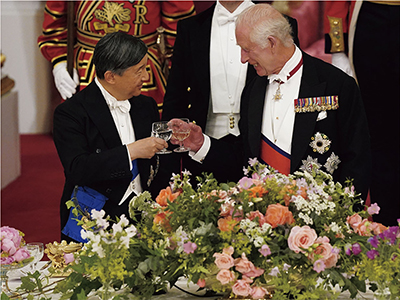 His Majesty the Emperor and His Majesty the King at the State Banquet (June 25, Buckingham Palace, UK; Photo: British Royal Family)
His Majesty the Emperor and His Majesty the King at the State Banquet (June 25, Buckingham Palace, UK; Photo: British Royal Family)During the three-day period from June 25 to 27, Their Majesties were welcomed as State Guests. They attended a Ceremonial Welcome at Horse Guards Parade (the parade ground of the Household Cavalry), a luncheon held by His Majesty King Charles III at Buckingham Palace, and a State Banquet given by Their Majesties King Charles III and Queen Camilla. Along The Mall on the way from the Ceremonial Welcome to the luncheon, the flags of Japan and the UK were flown, and Their Majesties the Emperor and Empress received a grand welcome from the many people lining the route as they rode in a state carriage alongside Their Majesties the King and Queen. In his address at the banquet, His Majesty the Emperor stated, “It is my sincere hope that both Japan and the UK, as friends like no other, will continue to make untiring efforts for true mutual understanding through exchanges of their people, thereby building an enduring relationship based on friendship, goodwill and cooperation.”
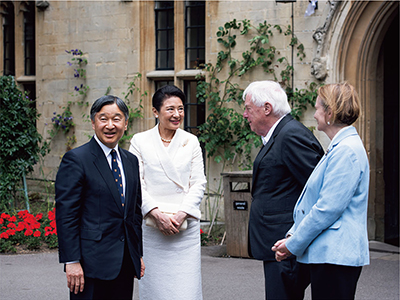 Their Majesties the Emperor and Empress visiting Balliol College (June 28, Oxford, UK; Photo: Oxford University)
Their Majesties the Emperor and Empress visiting Balliol College (June 28, Oxford, UK; Photo: Oxford University)On June 28, Their Majesties visited Oxford. After visiting Balliol College, where Her Majesty the Empress once studied abroad, Their Majesties attended a luncheon held by the Chancellor of Oxford University, The Rt Hon the Lord Patten of Barnes. During his remarks at the luncheon, His Majesty the Emperor stated, “It is my wish that all the... students, academics and researchers from the United Kingdom and countries all over the world, including Japan, will continue to inspire and uplift each other, pointing the way towards a brighter future not just for our two countries but for the whole world.” Following the luncheon, Her Majesty the Empress was awarded an honorary degree. Their Majesties also visited Merton College, where His Majesty the Emperor studied in the past, and planted cherry trees.
His Majesty the Emperor also attended a reception with members of the Japanese community and friends of Japan in the UK, where he met with individuals who have contributed to promoting the Japan-UK relationship. He also visited Japan House London and the Thames Barrier, one of the world's largest movable flood barriers. At the banquet held by the Lord Mayor of London and City of London Corporation on June 26, His Majesty shared stories from his time studying at Oxford University, when he conducted research on the history of water transport on the River Thames.
This visit marked the third official State Visit to the UK by Their Majesties the Emperor and Empress in the history of Japan-UK relations. Symbolizing the Japan-UK partnership, the visit further deepened the friendship, goodwill, and cooperative relations between the two countries.
■Japan-Greece Relations
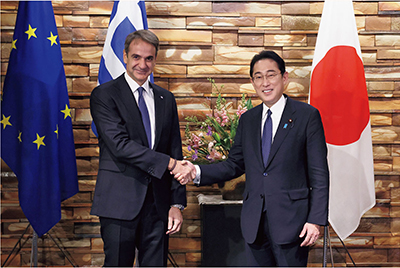 Japan-Greece Summit Meeting (January 30, 2023, Prime Minister's Office; Photo: Official Website of the Prime Minister of Japan and His Cabinet)
Japan-Greece Summit Meeting (January 30, 2023, Prime Minister's Office; Photo: Official Website of the Prime Minister of Japan and His Cabinet)Japan and Greece established diplomatic relations through the conclusion of the Treaty of Amity, Commerce and Navigation in 1899. As nations that share fundamental values and engage in global maritime transport, Japan and Greece began exchanges through the “sea” and have built up friendly relations over many years in various fields. In recent years, mutual visits by dignitaries have become more frequent, and in-person Japan-Greece Foreign Ministers' Meetings were held three times in 2018, 2019, and 2022. In 2023, Prime Minister Kishida held a summit meeting with Prime Minister Kyriakos Mitsotakis, who was on an official working visit to Japan. The two leaders issued a joint statement to elevate Japan-Greece relations to a “strategic partnership.” In the economic field, the Tax Convention between Japan and the Hellenic Republic was signed in the same year. After ratification by both countries' parliaments, the Tax Convention entered into force in December 2024. It is expected to further promote bilateral investment and economic exchange. In addition, as a member of both the European Union (EU) and the North Atlantic Treaty Organization (NATO), Greece also shares with Japan various common interests, including the maintenance and strengthening of the free and open international order based on the rule of law at sea. Japan-Greece relations are expected to continue developing not only in bilateral cooperation but also in the international arena.
■The 125th Anniversary of the Establishment of Diplomatic Relations between Japan and Greece: “Year of Culture and Tourism Between Japan and Greece”
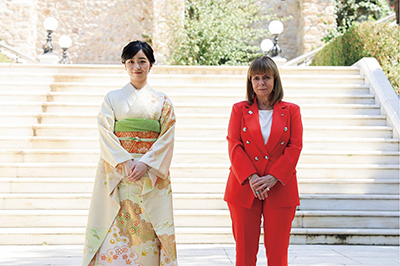 President Sakellaropoulou and Her Imperial Highness Princess Kako of Akishino (May 28, Athens, Greece; Photo: Presidency of the Hellenic Republic)
President Sakellaropoulou and Her Imperial Highness Princess Kako of Akishino (May 28, Athens, Greece; Photo: Presidency of the Hellenic Republic)Japan and Greece are both major global tourism nations with rich cultures. 2024 marked the 125th anniversary of the countries' bilateral relations, and was designated as the “Year of Culture and Tourism Between Japan and Greece” (as agreed upon during the Japan-Greece Summit Meeting in January 2023). This led to an increase in bilateral exchanges. The visit to Greece by Her Imperial Highness Princess Kako of Akishino in May was a highlight of this commemorative year and served as a major opportunity to demonstrate the friendly relations between the two countries both domestically and internationally. Her Imperial Highness met with President Katerina Sakellaropoulou as well as Prime Minister Mitsotakis and his wife, and attended various events such as the “Commemorative Ceremony for the 125th Anniversary of the Establishment of Diplomatic Relations between Japan and Greece and Year of Culture and Tourism Between Japan and Greece.”
As part of the commemorative events for the Year of Culture and Tourism, a variety of highly popular events were held in Greece, including Noh performances, lectures by renowned architects, film festivals, and events related to Japanese cuisine, anime, martial arts, traditional Japanese clothing, woodblock prints, and more. Many events were also held in Japan, including a celebration for the special binding edition publication of Greek literary master Nikos Kazantzakis' Travelling Japan, which was held during the visit of Greek Minister of Tourism Olga Kefalogianni, a photo exhibition by a renowned photographer themed on Greece, and a diplomatic archives exhibition co-hosted with the Embassy of Greece in Japan at the Diplomatic Archives of the Ministry of Foreign Affairs. Through such a wide range of commemorative events in the fields of culture and tourism, the friendship between Japan and Greece has deepened further.
Japan, which faces the Pacific Ocean, and Greece, which is surrounded by the Mediterranean Sea, are geographically distant. However, the relationship that has been cultivated through the “Year of Culture and Tourism Between Japan and Greece” serves as a solid foundation for the two countries to work closely together in the international community to address common challenges and further advance their relations.



